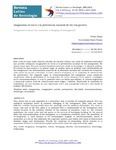Mostrar o rexistro simple do ítem
Imaginarios en torno a la pertenencia nacional de los inmigrantes
| dc.contributor.author | Aliaga Sáez, Felipe Andrés | |
| dc.date.accessioned | 2019-04-09T07:35:29Z | |
| dc.date.available | 2019-04-09T07:35:29Z | |
| dc.date.issued | 2016 | |
| dc.identifier.citation | Revista Latina de Sociología,2016,6(1):45-59.ISSN: 2253-6469 | es_ES |
| dc.identifier.issn | 2253-6469 | |
| dc.identifier.uri | http://hdl.handle.net/2183/22570 | |
| dc.description.abstract | [Resumen] Este artículo tiene como objetivo abordar de manera teórica una serie de aspectos esenciales que pueden configurar imaginarios en torno a la pertenencia nacional de los inmigrantes. Se toman como base distintos autores fundamentalmente desde la sociología y la filosofía política. El trabajo es tipo ensayo y en primer lugar se analiza cómo se produce una confrontación de los inmigrantes con determinados aspectos de la identidad nacional del contexto de recepción, tales como: las pautas culturales, el orden social y el espacio; en la búsqueda de construcción de pertenencia. En segundo lugar el transnacionalismo del inmigrante como condición sospechosa, dada la posibilidad de re-emigración. Un tercer elemento es el soporte tecnológico en el transnacionalismo, el cual se presenta como un factor que aliviana el proceso migratorio y construye nuevos tipos de interacciones entre origen y destino. Finalmente la condición de ciudadanía, la cual transita en una separación entre una concepción cultural y otra desde el enfoque del derecho | es_ES |
| dc.description.abstract | [Abstract] This article has as aim approach in a theoretical way a number of essential aspects that can configure imaginary about of national belonging of the immigrants. They take asa basis different authors fundamentally from the sociology and the political philosophy. The work is essay type and in the first place it is analyzed how a confrontation of the immigrants with certain aspects of the national identity of the context of reception, such as: the cultural guidelines, the social order and the space; in the pursuit of belonging building. In the second place the transnationalism of the immigrant as a suspicious condition, given the possibility of re-emigration. A third element is the technological support in transnationalism, which is presented as a factor that alleviates the migration process and builds new types of interactions between origin and destination. Finally the condition of citizenship, which transits in a separation between a cultural conception and another from the approach of the right. | es_ES |
| dc.language.iso | spa | es_ES |
| dc.publisher | Universidade da Coruña | es_ES |
| dc.relation.uri | https://doi.org/10.17979/relaso.2016.6.1.1964 | |
| dc.rights | Atribución-CompartirIgual 3.0 España | es_ES |
| dc.rights.uri | http://creativecommons.org/licenses/by-sa/3.0/es/ | * |
| dc.subject | Imaginarios | es_ES |
| dc.subject | Inmigrantes | es_ES |
| dc.subject | Nación | es_ES |
| dc.subject | Pertenencia | es_ES |
| dc.subject | Identidad | es_ES |
| dc.subject | Transnacionalismo | es_ES |
| dc.subject | Tecnología | es_ES |
| dc.subject | Ciudadanía | es_ES |
| dc.subject | Imaginary | es_ES |
| dc.subject | Immigrants | es_ES |
| dc.subject | Nation | es_ES |
| dc.subject | Belonging | es_ES |
| dc.subject | Identity | es_ES |
| dc.subject | Transnationalism | es_ES |
| dc.subject | Technology | es_ES |
| dc.subject | Citizenship | es_ES |
| dc.title | Imaginarios en torno a la pertenencia nacional de los inmigrantes | es_ES |
| dc.title.alternative | Imaginaries about the national belonging of immigrants | es_ES |
| dc.type | info:eu-repo/semantics/article | es_ES |
| dc.rights.access | info:eu-repo/semantics/openAccess | es_ES |
| UDC.journalTitle | Revista Latina de Sociología | es_ES |
| UDC.volume | 6 | es_ES |
| UDC.issue | 1 | es_ES |
| UDC.startPage | 45 | es_ES |
| UDC.endPage | 59 | es_ES |






